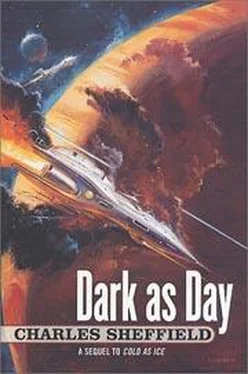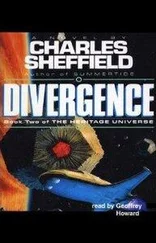Jan didn’t. Once they were out on the surface, Paul’s lead would be essential. She had been outside before, but compared to him she was a tyro. She fumbled her way into a suit at maximum speed and ran the last twenty meters up the surface ramp.
Looking off to her right as they emerged onto Level Zero she again saw a spiky city of gantries and scaffolds, glittering in reflected sunlight. Their layout had changed since last time. Ships by the dozen — by the hundred — lay scattered at the feet of the construction rigs, everything from bulbous freighters to spindly-legged singletons. High above everything hung the familiar ball of Jupiter, swollen and striated. To Sebastian it might be an object of infinite fascination, but she could imagine how others saw it: only a madman would leave Ganymede and fly closer to Jupiter, just to stare at atmospheric cloud patterns.
Jan heard a crackle on the wrist communications unit, then Milly Wu’s voice. “Rustum Battachariya is still on the line. He wants to keep in touch with you. I’ll try to patch him in to local video and audio.”
The voice that sounded in Jan’s suit, however, was not that of Rustum Battachariya. A musical contralto said, “Janeed Jannex? This is spaceport operations. We are taking over from automated surveillance. We have tracked your man, and he is entering a Mayfly-class single-seater.”
Paul broke in. “This is Paul Marr, first officer of the Achilles. Can you stop him taking off?”
“Oh, hi, Paul. Tess Walkabie here. Prevent him? How?”
Jan said, “Override the ship’s controls.”
“Come on, you ought to know better than that. Manual controls can always override remotes.”
Paul said, “What I had in mind was sending someone out to the ship.”
“Who? We have only three people on duty. Cargo arrivals and departures are automated, and no passenger ships are scheduled. We weren’t expecting emergencies, or much of anything. Don’t you people ever sleep? It’s the middle of the graveyard shift.”
The woman was right. To Jan, it seemed no particular time of day or night. She would do better to leave things to Paul, who knew what he was doing.
The woman went on, “If this Sebastian takes it into his head to fly, he’ll be gone long before we could get there. In fact, you are closer to him than we are.”
“Close enough to reach him in time to stop him taking off?”
“No. But I can direct you to another ship, Paul — a Flyboy scooter, two-person. Lots of volatiles already onboard.”
“That would be perfect. A Flyboy is faster than anything in the Mayfly class. No matter where he goes, we’ll be able to follow and catch him. Is it ready to lift?”
“Ready as you are. Do you want it?”
“Yes!”
“It’s yours. Bear twenty degrees left of your present heading. Keep moving and I’ll steer you to it.”
Jan needed steering. Lack of sleep, her over-rich meal, and the strange surroundings combined to remove her from reality. Her previous experience on the surface of Ganymede had been an unhurried stroll. Now she struggled to keep up with Paul, following him across a gritty plain of water-ice crystals a hundred and fifty degrees below their freezing point. It was not a run. It was not a walk. It was a rapid, unsteady shuffle past looming insectile derricks and through the long black shadows cast by squatty cargo hulls.
A flash of blue on her right made Jan turn that way. “There goes the Mayfly,” said the contralto voice. “He’s away. Don’t worry, you have less than a hundred meters to go.”
Neither Paul nor the chief of operations, Tess Walkabie, had said anything about the size of the scooter they would fly. Jan, climbing after Paul up the short ladder, found herself apologizing as she squeezed in beside him. Paul didn’t even acknowledge that he had heard her. He had taken the controls, and was flicking through a lightning status check.
Jan said, “I thought this was supposed to be ready to fly?”
“I’m sure it is. You just don’t skip your own checkout, ever. We’re in good shape. Operations? We’re ready to go, but I don’t have visual contact.”
“He’s out of your line-of-sight and range. Don’t worry about that. I’ll feed you the Mayfly’s ID and you or your autopilot can do the rest. Wherever he goes, your scooter can follow. You are faster, and you will catch up. Better set collision avoidance.”
“Doing it.” Paul flipped a switch. “Prepared for take-off.”
For Jan that was insufficient warning. Even after her earlier experience, she was unprepared when the scooter reared to a vertical position and accelerated upward — hard. She could not fall, because the seats were gimballed to follow the direction of acceleration, but the change in attitude brought her to an uncomfortable fore-and-aft posture, knees crunched tightly into the narrow space in front of her seat. Her view of the world outside the scooter became a flickering display, with beneath it a slit of transparent panel that looked ahead to an alien field of stars.
“He’s heading inward.” Paul was studying the information panel that ran across the upper edge of the viewing screen. “We’re trailing him, and our path is toward Jupiter. You were right, Jan. He’s back to his old fixation with cloud patterns.”
There was a sudden and surprising interruption. The voice of Rustum Battachariya, so faint and garbled by interference as to be almost unidentifiable, broke in from the wrist unit that Milly Wu had given to Jan. “A fixation with clouds would be acceptable. Regrettably, that may not be the case.”
The unit was not designed for such long-range operation. Bat was fading in and out as he went on, “If Sebastian Birch merely desired to observe… disturbance in Jovian atmosphere… would not have encouraged such immediate action. Unfortunately…”
Jan said, urgently into the tiny unit, “What is he doing? I have to know.”
“I fear that he seeks… atmospheric entry.”
“Why?”
“My apologies… I cannot discuss this. However, you must stop… seek to summon other forces…”
The rest of Bat’s words were lost in a wash of static.
“He’s going,” Paul said. “The wrist unit’s beyond the limit of its range.”
“He says Sebastian is going for Jupiter atmospheric entry.”
“Yes. Again.”
“Paul, we have to stop him. He doesn’t know what he’s doing. If someone can help us…”
“Not feasible.” Paul had turned on a signal detection system to scan the sky ahead of the Flyboy scooter, and a single red speck flashed on the screen. “That’s Sebastian’s ship. There’s no other vehicle in space between us and Jupiter. Europa and Io are on the other side of the planet, they can’t do us any good. Amalthea is in the right position, but it only has cargo vessels ready to fly. It’s up to us.”
“What can we do?”
“So long as he keeps accelerating, not much. We have no way to change his course, no way to disable his ship without killing all of us.”
Paul adjusted a setting, and the broad arc of the Jupiter terminator appeared on the screen next to the flashing speck of red. “It’s going to take a while to catch up, but we’ll be alongside him long before he’s close to the planet. Then I can blanket him with emergency frequency radio signals, and he’ll have to listen — he can’t switch that unit off. It will be up to you, Jan. You have to talk to him. Persuade him to turn his ship around and head back to Ganymede.”
Persuade him? You don’t know Sebastian. But it would be pointless to say that to Paul. Who did know Sebastian? Certainly not Jan, though she had spent every waking hour with him for many years.
She sank back into her seat, staring at the blinking red dot on the screen. It was slowly brightening, but the arc of Jupiter seemed to grow more rapidly. “How much time do we have?”
Читать дальше












